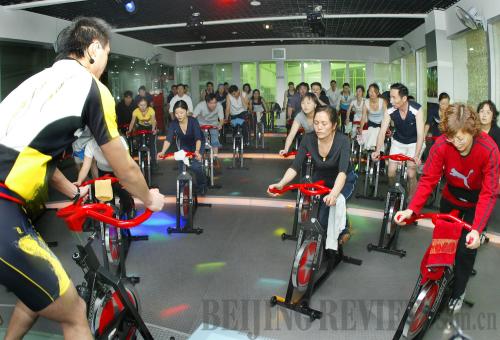|
 |
|
FITNESS COUNTS: Sports fans exercise in a gym in Ningbo, east China's Zhejiang Province (CFP) |
He also urged the formulation and implementation of a middle- and long-term development plan for young soccer talent.
According to the plan, about 20,000 schools nationwide, including primary and high schools as well as universities, will develop football training programs in the next three years, an increase from the 5,000 involved today.
"It's not about the number of soccer schools that are planned to be built, but their quality," said Chu Chaohui, a research fellow with the National Institute of Educational Sciences.
"Countries which are strong in soccer performance are not guided by policy, but a culture in which students enjoy playing football after school," said Wang Dazhao, a sports critic and senior member of the Chinese Football Association.
Chu suggested a new assessment system be introduced to ensure the overall quality and effectiveness of the enhanced physical education curriculum.
"Such a system would need to have the physical well-being of students assessed by professional sports institutions, as the ultimate goal of the reform should be the improvement of students' physical health," he said.
The GAS has designated 5,084 football schools in the past five years, but the investment in them has risen to only 56 million yuan ($9.11 million) since last year, which stands in stark contrast to investment in soccer in Germany, worth approximately 700 million euro ($938.09 million) each year, the Beijing Youth Daily reported.
"Only a few teams sent by primary and high schools in Beijing have played in matches. Non-competitive matches take place between elementary and junior high schools while league matches among senior high schools are almost non-existent," said Yang Anli, a youth coach who used to play for Bayi Football Club.
The Outline of the National Plan for Football Development on Campuses (2015-20) is expected to be issued after half a year of research conducted by education and sports authorities.
The outline will coordinate links between education and sports authorities, considered a key aspect of reforming the training system in schools.
Alongside campuses, many football clubs in China have also been enthusiastic about establishing football schools as a way to foster a new generation of talented football players.
In 2012, Guangzhou Evergrande Football Club, supported by Evergrande Real Estate Group, invested about $160 million to launch its own football school with more than 10,000 students. Luneng Group Co. from Shandong Province also built a football school 10 years ago and is now one of the largest football schools in China.
According to Liu Jiangnan, Executive President of Evergrande Football School, these schools feature a strong integration of academic studies and training. The organizers of these schools also hope to persuade parents to adopt a more realistic attitude concerning their children's futures.
"Chinese parents have long held the wrong view about soccer. They want their children to become soccer stars the minute they leave school, but actually, only a small number of children will go on to play professionally," Liu said.
Like children at regular primary and middle schools, the students at Evergrande study a wide range of academic topics. "The students train after they have finished their academic day, a method commonly used in European countries for youth training," Liu said, adding that although there were about 4,000 traditional soccer schools in China during the 1990s, most were forced to close as a result of the sport's poor public image in the country.
"We are making efforts to introduce top teachers and professional coaches at the school. Everything is aimed at boosting Chinese soccer in the long term," he said.
Now, Guangzhou R&F, which employs Sven-Goran Eriksson, a Swede who managed England's national soccer team for several years, is making similar efforts to boost youth training.
In cooperation with the English Premier League giant Chelsea, the club has launched a soccer school in Meizhou, in eastern Guangdong.
"Because we prioritize academic studies, we have hired qualified teachers, but we have also employed some coaches from Chelsea," said Hong Youqiang, the school's executive head.
Fernando Sanchez Cipitria, Technical Director of Evergrande School, said the combination of training and study would help to boost Chinese soccer. "Academic study is of great importance to young, developing players. A professional player will find it hard to find a career after retirement if he hasn't been well educated in his youth," the retired Spanish player said.
After two years of studying and training, many students at Evergrande School have demonstrated their potential, and some of them have been sent to Europe for short-term training and playing experience, according to Liu.
"Parents are now more confident, because they believe their children will perform better in school, both academically and on the soccer field," he said.
However, insiders believe the game should be better promoted, not only in dedicated soccer schools, but also throughout society as a whole.
"We don't see children playing soccer in public places because we don't have a soccer culture," said Xie Liang, a veteran commentator for Radio Guangdong.
According to Xie, only when the country develops a healthy soccer culture—not for the thrill of winning, but for the fun of participating—will Chinese soccer improve.
"We should boost the number of young people playing soccer. To do this, the game should be better promoted on all campuses and not just in soccer schools," he said.
Email us at: yinpumin@bjreview.com
China's Sporting Goals
5 trillion yuan—projected worth of the sports industry by 2025
500 million—number of people who will regularly participate in sports by 2015
100 percent—predicted coverage of new neighborhoods with sports facilities
15 percent—business income tax rate for hi-tech firms in the sports industry, lower than the 25 percent rate for other industries | 